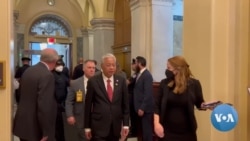The U.S. hosts a summit of Association of Southeast Asian Nation leaders.
Hello and welcome to VOA Asia Weekly. I'm Chris Casquejo in Washington. That story coming up.
But first, making headlines.
Former Hong Kong police chief John Lee was elected the business hub’s new leader without contest. He pledged allegiance to China’s central government.
Cardinal Joseph Zen, the outspoken former Roman Catholic bishop of Hong Kong, was arrested under the national security law for alleged foreign collusion.
South Korea's new president, Yoon Suk-yeol, began his five-year term vowing to enforce sanctions on North Korea and stand up for freedom and democracy.
World’s largest automaker Toyota warned "unprecedented" hikes in raw material costs could reduce profits by up to a fifth this year.
Buildings shook briefly in Taipei after a 6.1 magnitude earthquake struck off Taiwan’s east coast.
Ferdinand Marcos Junior, the namesake son of the ousted Philippine dictator, declared victory in this week’s presidential elections.
Vowing to be a leader "for all Filipinos," Marcos Junior garnered more than 31 million votes in an unofficial count. (STOP)
He will take office on June 30th after the results are confirmed by the Philippines’ Congress.
While the leaders of the Philippines and Myanmar are not attending the U.S-ASEAN summit, it is the first time for Southeast Asian leaders to gather here in Washington. As VOA’s Jessica Stone reports, it comes at a critical time for regional security and increasing economic engagement.
Since the first ASEAN Summit was held in the U.S. in 2016 at Sunnylands in California, Southeast Asian leaders have witnessed a military coup, natural disasters, a pandemic and now fuel and food shortages due to the war in Ukraine and China’s port lockdowns.
“In Asia, you know, trade, for example, is often perceived as strategy. And we know historically that while the U.S. has been very, very successful in the security element of strategy, it’s the trade dimension of strategy that has been more challenging.”
While six ASEAN member states are among Washington’s top trading partners, experts say the U.S. will not unveil any major economic engagement initiatives during the summit.
So what can the summit deliver for the region?
Observers say Southeast Asia wants reassurances that American military support for NATO and Ukraine will not come at a cost to continuing its commitments in the Indo-Pacific.
Experts also say Washington needs to send a clear message on the U.S.-China relationship, particularly around freedom of navigation the South China Sea.
“You have to see strong condemnation of Chinese behavior at every summit like this or some parties in the region point and say, see the U.S. has gone wobbly.”
One area where ASEAN is already stepping in, is providing an alternative to the Chinese manufacturing supply chain. The U.S. ASEAN Business Council says Malaysia is expected to announce increased cooperation with American semiconductor manufacturers.
Jessica Stone, for VOA News, Washington.
Please visit our website voanews.com for the most up-to-date news. This is VOA Asia Weekly.
Tensions are still running high in Sri Lanka following the resignation of Prime Minister Mahinda Rajapaksa.
His brother, President Gotabaya Rajapaksa, has so far refused to resign.
A severe foreign currency shortfall has resulted in acute shortages of necessities.
Finally on VOA Asia Weekly, Australian government scientists say the iconic Great Barrier Reef has sustained another mass coral bleaching event.
The Great Barrier Reef Marine Authority said more than 90% of the world’s largest coral reef ecosystem was bleached during a prolonged summer heat wave.
Bleaching occurs when the sea is too warm, for too long. It forces the coral to expel microscopic algae that gives it most of its energy and color.
It was the fourth such mass bleaching event in seven years.
That’s all the time we have here on VOA Asia Weekly.
Thank you so much for joining us. I’m Chris Casquejo. Please be sure to tune in again next week.











